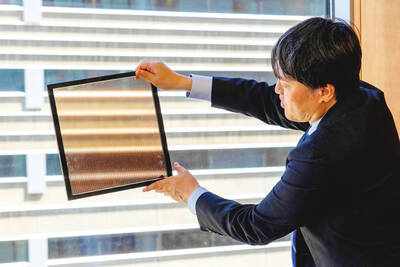Trend Micro Inc (趨勢科技), the nation’s top software company by market share, anticipates double-digit sales growth in Taiwan this year as the need for information technology (IT) security becomes even more pressing amid increasing Internet activity worldwide.
As a leader in Internet content security, Trend Micro reported 15 percent year-on-year domestic revenue growth last year, capturing around 46 percent of the local anti-virus market, the company said at a press briefing on Wednesday.
The company said that wide use of universal serial bus (USB) devices and the Internet has made USB and Web threats the two main sources of security issues. The top three viruses that affected domestic computers last year were the downloader virus, the vital information resource under siege virus and the portable executive virus, accounting for 35 percent, 22 percent, and 12 percent of reported local cases.
Oscar Chang (張偉欽), executive vice president of Trend Micro’s Greater China region, warned of rising potential threats this year, including attacks on social networking Web sites, USB-embedded spyware and malicious software written specifically for smartphone platforms.
“As social networking becomes mainstream, these Web sites become festering grounds for criminal activities. For instance, by stealing information from powersellers and spamming their clients, high-tech thieves can engage in transactions with unsuspecting shoppers and sell items that they don’t have,” said Samson Tai (戴燊), marketing director of Trend Micro’s Taiwan business unit.
“Moreover, it’s not enough to simply ignore spam e-mails; often times, hackers send personal e-mails mimicking an acquaintance, but as soon as you open the encoded e-mail, your computer’s infected,” Tai added.
Furthermore, electronic devices with USB autorun programs, such as smartphones, are turning into favorable mediums to transfer malware from one computer to another, the company said.
With each computer sync, spyware is transferred onto computers, which is increasing viruses online at faster speeds than anti-virus companies can track them, Tai said.
Trend Micro also foresees Internet criminals directly writing malicious softwares for smartphone platforms such as Windows mobile and Linux.
Also, with the emerging trend of cloud computing, virtual resources are provided as a service over the Internet, putting worldwide computer users at risk.
“Applications such as Web 2.0 or the Google applications are examples of cloud computing, and their virus attacks are much more severe and direct,” Chang said.

UNCERTAINTIES: Exports surged 34.1% and private investment grew 7.03% to outpace expectations in the first half, although US tariffs could stall momentum The Chung-Hua Institution for Economic Research (CIER, 中華經濟研究院) yesterday raised its GDP growth forecast to 3.05 percent this year on a robust first-half performance, but warned that US tariff threats and external uncertainty could stall momentum in the second half of the year. “The first half proved exceptionally strong, allowing room for optimism,” CIER president Lien Hsien-ming (連賢明) said. “But the growth momentum may slow moving forward due to US tariffs.” The tariff threat poses definite downside risks, although the scale of the impact remains unclear given the unpredictability of US President Donald Trump’s policies, Lien said. Despite the headwinds, Taiwan is likely

When Lika Megreladze was a child, life in her native western Georgian region of Guria revolved around tea. Her mother worked for decades as a scientist at the Soviet Union’s Institute of Tea and Subtropical Crops in the village of Anaseuli, Georgia, perfecting cultivation methods for a Georgian tea industry that supplied the bulk of the vast communist state’s brews. “When I was a child, this was only my mum’s workplace. Only later I realized that it was something big,” she said. Now, the institute lies abandoned. Yellowed papers are strewn around its decaying corridors, and a statue of Soviet founder Vladimir Lenin

UNIFYING OPPOSITION: Numerous companies have registered complaints over the potential levies, bringing together rival automakers in voicing their reservations US President Donald Trump is readying plans for industry-specific tariffs to kick in alongside his country-by-country duties in two weeks, ramping up his push to reshape the US’ standing in the global trading system by penalizing purchases from abroad. Administration officials could release details of Trump’s planned 50 percent duty on copper in the days before they are set to take effect on Friday next week, a person familiar with the matter said. That is the same date Trump’s “reciprocal” levies on products from more than 100 nations are slated to begin. Trump on Tuesday said that he is likely to impose tariffs

Japan is heavily investing in a new kind of ultra-thin, flexible solar panel that it hopes will help it meet renewable energy goals while challenging China’s dominance of the sector. Pliable perovskite panels are perfect for mountainous Japan, with its shortage of flat plots for traditional solar farms. A key component of the panels is iodine, something Japan produces more of than any country but Chile. The push faces some obstacles: Perovskite panels contain toxic lead, and, for now, produce less power and have shorter lifespans than their silicon counterparts. Still, with a goal of net zero by 2050 and a desire to